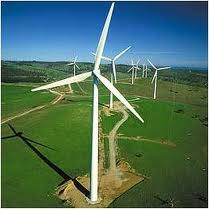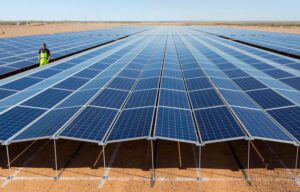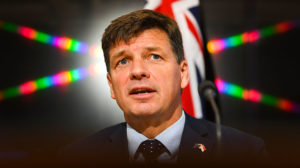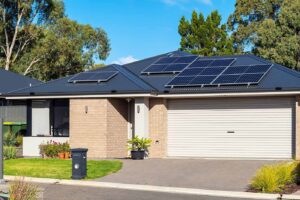Tony Abbott was swept to power on Saturday and declared the country to be under new management and “open for business.” If it is true for any industries, it is certainly not the case for large-scale renewables.
The wind energy sector is probably the biggest and most immediate loser from this election result. It has been at a virtual standstill for months because utilities who write contracts, and the bankers who finance the projects, were mindful of a likely Coalition win, and yet another review of the large-scale renewable energy target (LRET)
That review will now take place, but will unlikely to be completed until the end of 2014, and the findings may not be known until early 2015. The Coalition certainly appears in no hurry, and unless the renewables industry can find a compromise, it will have to wait for the result. To make matters worse, the review may not be completed by the Climate Change Authority – which last year rejected the complaints of incumbent fossil fuel generators and the conservative state governments – because the Coalition now has the numbers to dump the CCA.
The election has delivered a hung parliament of a different sort, and a number of new, strongly anti-wind members to the Coalition. These include Angus Taylor in Hume and Peter Hendy in the neighbouring seat of Monaro. Taylor is the author of an ill-informed document on wind energy, and Hendy was an advisor to Brendan Nelson when he made his fateful change of position on climate policies, and is also a former CEO of the anti-carbon price, anti-renewables Australian Chamber of Commerce and Industry.
Worse, the Senate looks potentially hostile to wind energy, now that Labor and the Greens appear to have lost their ability to block changes after June 30. The role of avowed anti-wind senators such as John Madigan, and Nick Xenophon (who nearly managed to clone himself in Saturday’s result), presents a formidable problem for the wind industry.
Zed Seselja, who may win an ACT Senate seat for the Coalition, is another anti-renewable warrior, and the opinions on wind and renewables from the remaining cast of the Senate circus is not clear. Clive Palmer could have two Senators – Glenn (the brick with eyes) Lazarus and Jacqui Lambie. While a noisy maverick, Palmer’s principal interests are coal and dinosaurs.
Family First Senator-elect Bob Day is a former member of the highly conservative HR Nicholls Society, so that is not promising. The views of the motoring, sporting, and shooting groups who may win seats is not known, possibly even by them. Madigan didn’t get elected on an anti-wind farm ticket either, but his acquired hostility may be his lasting legacy.
A further complication for the wind industry is the Coalition’s determination to hold yet another review of wind farm health impacts and its proposal to introduced “real time” wind farm monitoring, which the industry says would be expensive and useless.
Solar to go local
Wind farms are most affected by the RET review because large scale solar PV plants are unlikely to be able to compete on costs just yet. The plants that are being built are relying on other mechanisms such as Solar Flagships, or the three smaller plants being built under the ACT auction process.
However, one sector that may be active in the next 18 months will be smaller, distributed scale solar PV projects in the 2MW to 10MW range – like those proposed by Soleir solar project in Dubbo and the Sunshine Coast council facility in Queensland. That’s because there are lower capital requirements and risk, different funding mechanisms can be obtained, and the projects may not have to compete in the wholesale market.
In fact, there is no doubt that the biggest investment in renewable energy over the coming 18 months will come from households and business owners, who have been the biggest investors in recent years and will continue to install rooftop solar PV to generate their own electricity, and reduce their bills.
The wildcard here is the role of the state governments, particularly in NSW, Queensland and Western Australia, which are hostile to renewable energy and also have assets – generators and network operators – that they want to sell.
Miners take centre stage
The Coalition’s vow that it is open for business – and its promise to cut green tape – seems pitched almost entirely to the mining industry. Australia’s richest person, Gina Rinehart, made an appearance at the celebration party of Barnaby Joyce, now in the lower house, and one day likely to be Australia’s deputy prime minister and acting prime minister.
The Australian Financial Review on Monday declared Rinehart to be “our favourite miner.” No, really. Clive Palmer has a massive self-interest to promote his Galilee Basin coal interests which adjoin Rinehart’s – environmental approvals for infrastructure such as the port at Abbott Point will be decided by Greg Hunt – but that will be unlikely to restrict Palmer’s comments. One wonders just what he will say under parliamentary privilege.
Carbon price around for another year
The carbon price will last at least until the end of the financial year, thanks to Labor’s stiffened resolve, and may last longer still, depending on what, if anything, the new government can propose in its place.
The disintegration of Labor’s Senate representation means that Labor and The Greens (despite the latter’s extra seat or two) no longer have the numbers to stop the repeal of the carbon price after July 1 next year, when the new Senators take their seats.
However, the better than expected performance by Labor, and comments by likely leaders Bill Shorten and Anthony Albanese suggest that Labor will defend the carbon price, at least until June 30. That will take the repeal into a time frame where China is accelerating its carbon price mechanisms, the final IPCC reports have been released, and other countries are moving to act. And maybe, just maybe, the science might be clearer – even to Abbott.
Abbott will have to think carefully about risking a double dissolution – it could just make the influence of the minority parties in the Senate even greater.
Australia’s international credibility
On the international stage, Australia now risks following in the footsteps of Canada – two countries of nearly unparalleled wealth who have sought to frustrate international agreement so that they can dig up their massive reserves of fossil fuels.
The reception of the Australian delegation at this year’s climate talks in Poland could be quite interesting. Actually, it will probably go down quite well with the Poles themselves, who have succeeded in blocking most of the EU policies on carbon pricing and renewables.
The fracturing of centralised power
The traditional parties are losing their centralized control of domestic politics, in much the same way as the primacy of the base-load generators is being challenged in the electricity market. The vote for the mainstream parties has fallen from around 80 per cent in 2010 to just less than 75 per cent in 2013, tracking a similar fall in the use of coal-fired generators. Is there a link? Probably not.
But it is fascinating to see the influence of minor parties in some states – the huge voted for the Palmer United Party in Queensland and Tasmania, for the Greens in Victoria, the Liberal Democrats in NSW, and for Xenophon in South Australia, where he outpolled Labor in the Senate and nearly pipped the Coalition.
Abbott had promised stable government, but the Senate could turn out to be a circus. Abbott may find the variability of views and positions in the Senate as difficult to deal with as some of his colleagues, and the incumbent generators, have in getting their minds and their systems around variable renewables.
A change in mood
In 2010, the parties with the biggest increase in votes in the federal poll were the Greens, the Sex Party and the Shooters and Fishers. This time, the parties with the biggest increase were the Coalition, the Palmer United Party and the Xenophon ticket.
Clearly, the mood has turned. Three years ago Australians voted to save the planet, make love and then shoot the lights out. Now they want to axe the tax, trash the turbines, did up coal – and then go down with Palmer’s remake of the Titanic.







